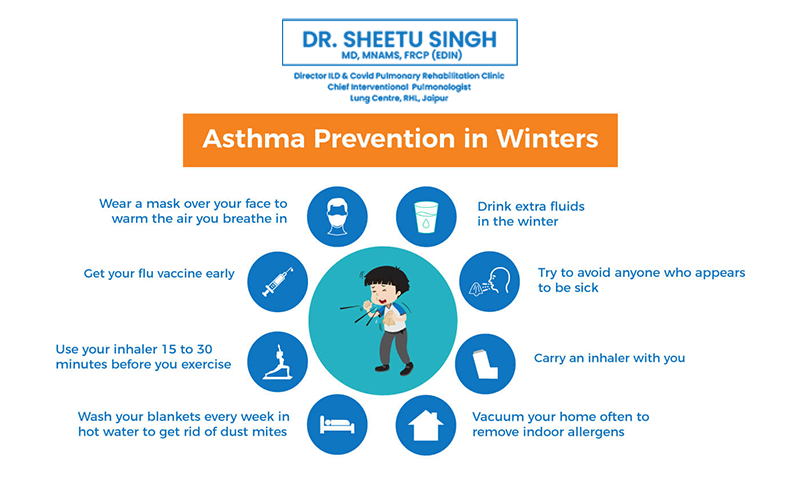
Winter Asthma Symptoms and Treatment: Asthma attacks may be more common in the winter for many people. In the winter, people with asthma face two challenges. One difference is that they spend more time indoors. The other factor is the ‘cold weather’.
Indoors, you take in asthma triggers including mold, pet dander, dust mites, and even hearth fires. When you go outside, the cold air could trigger an asthma attack.
Several treatments and preventive practices can assist a person with asthma reduce the impact of chilly air.
This article explains why cold weather can aggravate asthma symptoms and how to identify when symptoms are triggered.
Does Cold Weather Impact Asthma?
When an asthmatic inhales cold, dry air, the muscles inside the lungs begin to spasm in an attempt to keep the airways open. This irritates the airway lining, leading in wheezing, shortness of breath, and coughing.
Many asthmatics have difficulty breathing due to the dryness of cold air. Symptoms may also be caused by cold air paired with windy conditions. The severity of your asthma increases your chances of being affected by cold air.
Connection Between Asthma and Heart Attack
Asthmatic airways (bronchial tubes) expand and become irritated in reaction to certain stimuli. Swollen airways are narrower and cannot accommodate as much air. As a result, persons with asthma frequently have difficulty catching their breath.
Winter is especially difficult for asthmatics. According to a 2014 Chinese study, hospital admissions for asthma increased over the winter months. In the chilly climate of northern Finland, up to 82 percent of asthmatics experienced shortness of breath when exercising in cold weather.
When you exercise, your body requires extra oxygen, therefore your breathing rate increases. To take in more air, you frequently breathe through your mouth. While blood vessels in your nose warm and humidify the air before it reaches your lungs, air that passes directly through your mouth is chilly and dry.
Exercising outside in chilly weather forces cold air into your airways quickly. It also seems to enhance your chances of getting an asthma episode. What exactly is it about chilly air that causes asthma symptoms?
How Asthma Symptoms Get Affected by Cold Weather?
- The cold air is dry
A thin film of fluid lines your airways. When you breathe dry air, the fluid in your lungs evaporates quicker than it can be restored. Asthma symptoms develop as dry airways become inflamed and swollen.
Cold air also triggers your airways to generate histamine, the same chemical your body produces during an allergic attack. Wheezing and other asthma symptoms are exacerbated by histamine.
- The cold promotes mucus production
Your airways are also lined with a layer of protective mucus, which aids in the removal of harmful particles. Your body creates more mucus in cold temperatures, but it is thicker and stickier than usual. The additional mucus increases your chances of getting a cold or another infection.
- You Get Sick and Prevent Outsides during Winters
During the winter, colds, flu, and other respiratory illnesses are more common. These infections have also been linked to an increase in asthma symptoms.
Cold air can also cause you to stay indoors, where dust, mold, and pet dander thrive. Some people develop asthma symptoms when exposed to these allergens.
How to Manage Asthma in Cold Weather?
If a person has an asthma attack brought on by cold weather, they should use their short-acting inhaler first to loosen and open up the airways.
This inhaler often contains albuterol, a beta agonist. If a person is going outside in cooler weather, they should always bring their inhaler with them.
Next, a person suffering from cold-induced asthma should try to get to a warmer environment as soon as feasible.
After several minutes of breathing in warmer air, the airways should begin to open up and symptoms should subside swiftly.
If a person has these symptoms on a frequent basis, they should consult their doctor. Long-term therapy, such as a long-acting bronchodilator, may be prescribed by the doctor.
Exercise-induced bronchoconstriction is the medical name for when exercise causes asthma symptoms. A doctor may also give leukotriene receptor inhibitors to decrease this impact.
Working to control symptoms and minimize the amount of attacks for anyone with asthma can help prevent symptoms from developing in cold weather.
Consult Dr. Sheetu Singh
You must know that, Doctor Sheetu Singh is one best pulmonologist and allergist to treat your problems. She is experienced, and even has proof with records of healthy lives built by her incredible treatment. Consult with her, and don’t let asthma affect your life anymore.


2 comments
注册免费账户
November 28, 2024 at 8:33 pm
Your point of view caught my eye and was very interesting. Thanks. I have a question for you.
binance
December 8, 2024 at 11:12 am
Your point of view caught my eye and was very interesting. Thanks. I have a question for you.